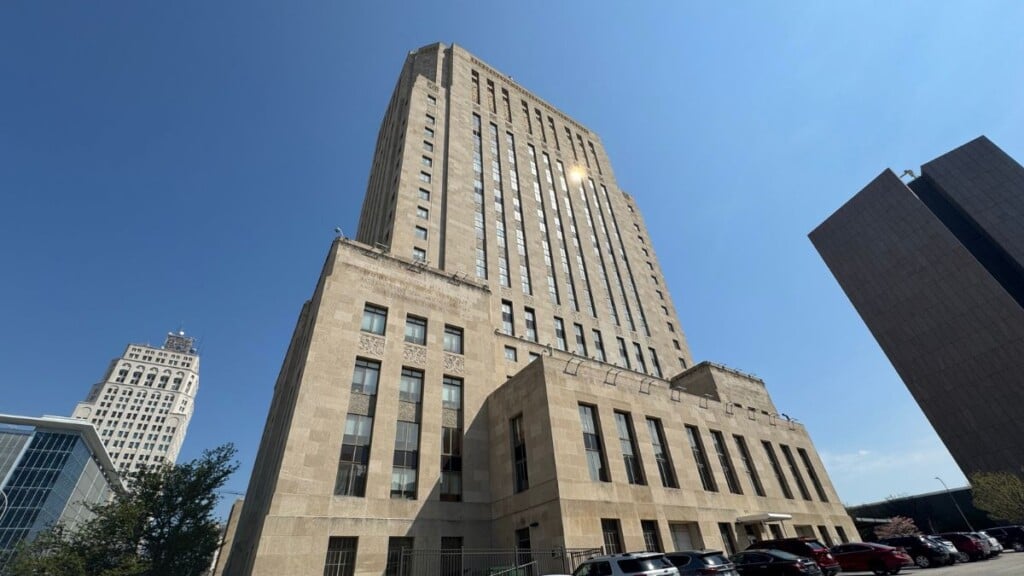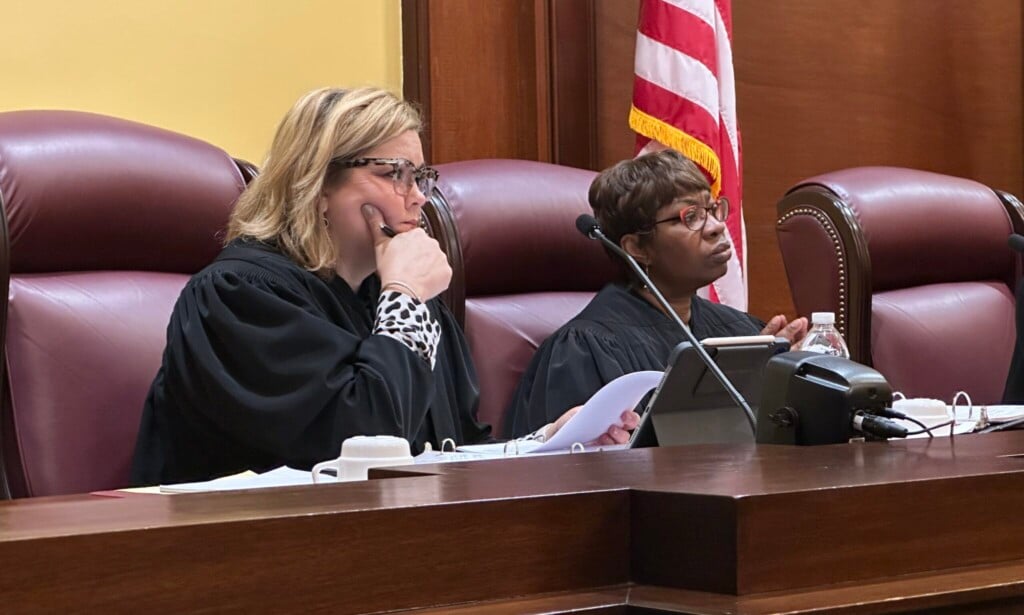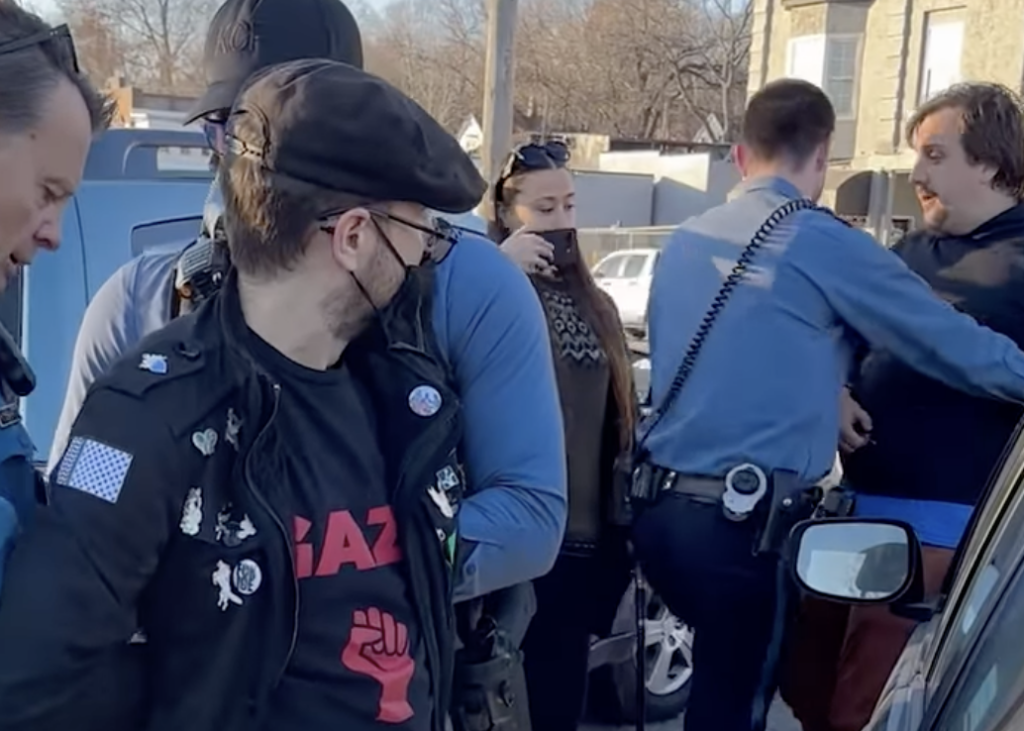Mid-term report: Kansas lawmakers prioritize culture war, squeeze social services and reject medical weed
We are halfway through the Kansas legislative session. There’s still more lawmaking to go, but the House and Senate are pushing major policy ideas.

Kansas lawmakers have passed dozens of bills at the halfway point of the session. Credit: Blaise Mesa / The Beacon
Kansas Republicans are cracking down on social services programs, creating new crimes and rejecting proposals by Democrats.
It’s the halfway point through the state legislative session and Kansas lawmakers have passed dozens of bills through the House and Senate. Some bills could fail or be significantly altered when they get to the other chamber. Other bills could pass through with few amendments. And some bills have yet to have a hearing.
Here is a summary of what lawmakers have done so far.
Property taxes
SCR 1603 — A constitutional amendment that would cap increases in residential assessed valuations at 3%.
Property tax relief is a top priority for lawmakers this year. They passed a $1.2 billion tax cut last year, but heard from constituents that more property tax relief is needed. There are dueling constitutional amendments in the House and Senate. The Senate has passed its version, and the House is considering a similar proposal.
The Senate’s idea is a hard 3% cap. The House’s proposal would cap assessed valuation increases based on a rolling average of valuations over a handful of years. Lawmakers would determine how many years that rolling average applies for, with six years being the current proposal.
Rep. Adam Smith, a Weskan Republican, said the House is also planning to work on a property tax cut as well.
LGBTQ issues
SB 63 — A successful veto override on a ban on gender-affirming care for transgender minors.
SB 76 — Requiring teachers to address students with the name on their birth certificate and pronouns based on their gender at birth. Parents could sign off on name or pronoun changes. Teachers couldn’t be fired for intentionally misgendering students.
HB 2311 — A bill expanding religious protections for families in foster care that would prevent the system from punishing potential foster families who don’t support LGBTQ people.
These bills passed because of Republican support, despite efforts to block them by Democrats.
House Minority Leader Brandon Woodard, a Lenexa Democrat, was frustrated the Legislature was focused on social issues rather than cost-of-living problems.
“It’s baffling to me,” he said on the House floor. “We all just got elected. We all just listened to the people of our districts talk about the cost of living, about the inability to afford groceries, about the inability to afford everyday expenses, and yet … the first piece of legislation that we’re sending to (the governor’s) desk was a culture war issue.”
The gender-affirming care ban was a veto override fight that passed almost exclusively on party lines. The religious protections bill has a veto-proof majority in the House. But the bill about names and pronouns in schools currently doesn’t have enough Republican support to survive a veto fight.
Criminal justice
SB 156 — Creating the crime of unlawful use of a laser pointer. Laser pointers can’t knowingly be pointed at police or aircraft.
HB 2183 — Making it a crime to create AI child porn.
HB 2164 — Allowing 20 year olds to apply for certification as a law enforcement officer. The previous age was 21.
HB 2182 — Preventing counties from charging court fees to survivors of domestic abuse or stalking who are seeking protection orders.
These bills all passed with bipartisan support.
The most controversial of the bunch was allowing 20-year-olds to apply for police certification. Twenty-four lawmakers voted against it. Rep. John Carmichael, a Wichita Democrat, said he wants to help police find qualified officers, but he worries 20 years old is too young.
“For the minimal benefit of a few months,” he said, “we’re going to take people who are probably not mature enough to be law enforcement officers.”
Rep. Kevin Schwertfeger, a Turon Republican, said law enforcement supports this bill because it increases the recruiting class. Someone could apply for certification at 20, but they couldn’t become an officer until 21.
“Maybe we have more willing people who are younger … and we would hate to deny them the ability to become employed and start on their career path when they choose to,” Schwertfeger said.
Health
Sub SB 29 — Preventing local health officers from banning public gatherings during infectious outbreaks.
Sen. Beverly Gossage, a Eudora Republican, said this bill is in response to the COVID-19 pandemic. She said the state can’t let local officials close buildings — like churches — during another pandemic.
Some Republicans joined Democrats in opposing this bill.
Social services
SB 79 — Prohibiting food stamps from being used to buy candy or soda.
This bill lets Kansas be a good steward of taxpayer dollars, said Sen. Renee Erickson, a Wichita Republican.
The Supplemental Nutrition Assistance Program (SNAP) is about feeding low-income people. Candy and soda won’t nourish someone, and nourishing someone is what SNAP is about — “nutrition assistance” is in the name, Erickson said.
“We want people to be healthy,” she said. “We know they can buy things that aren’t healthy, but this is a start in saying taxpayers don’t want to pay for pop and candy.”
Democrats don’t see it that way.
They said this bill does nothing to address food deserts or other issues that limit access to healthy foods.
The proposal is also inconsistent, said Senate Minority Leader Dinah Sykes, a Lenexa Democrat. It’s hard to define what candy is, so items with certain ingredients can still be bought with food stamps. KitKats, Twinkies and Twizzlers don’t qualify as candy under the bill.
It also bans hot food — so no rotisserie chickens.
The bill passed with some Republicans opposing it.
The proposal requires the state to send a waiver to the federal government to exclude these items from SNAP. Those waivers have been denied by Republican and Democratic administrations. Even if the bill passes, candy and soda might not be banned from SNAP funds.
Water
HB 2113 — Adding $2 million to a technical assistance fund and $6 million to a grant program to help water conservation.
Kansas lawmakers have funded water conservation before. But past grant programs have attracted $380 million in requests to a fund with only $18 million. Rep. Lindsay Vaughn, an Overland Park Democrat, said parts of the Ogallala Aquifer are declining and something needs to be done to address the issues.
The $8 million may seem like a lot of funding, but “this is barely scratching the surface of the issues that exist across our state,” she said.
Failed proposals
SB 250 — An amendment to include a medical marijuana program in this bill failed.
This bill allows Kansans to try individual, investigative treatments made by drug manufacturers. Democrats tried to add a medical marijuana program to the bill, but the amendment failed. The bill overall did pass.
Sen. Cindy Holscher, an Overland Park Democrat, said every state that borders Kansas has a medical marijuana program. She said it’s time for Kansas to get on board.
“There has to be a very direct consultation with a physician and again — terminally ill patients,” she said. “We should stand up for all of them and allow them access to this product, which has been proven to help with that.”
The idea has been shot down by the Republican-controlled Senate for years. Republicans said states like Oklahoma have a medical weed program, but it has turned into the Wild West where criminal activity flourishes.
SB 161 — An amendment to allow Medicaid expansion to this bill failed.
Medicaid expansion has been a priority for Gov. Laura Kelly for years. She’s proposed the idea every year as governor, including again this year. The bill has been consistently shot down by Republicans who argue it’s too expensive.
Senate President Ty Masterson, an Andover Republican, said other states with Medicaid expansion have seen an increase in medical appointments. That would clog up the system.
“It is not saving rural hospitals. It is blowing the budgets out in these states,” Masterson said. “I think in the end, we’re going to be proven to have done the correct thing.”
This article first appeared on Beacon: Kansas and is republished here under a Creative Commons license.![]()




